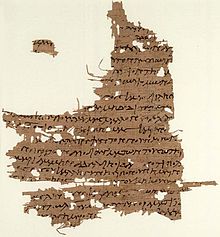These days we celebrate the Christian Easter which means that we commemorate and honor the sacrifice of the Jewish carpenter who was believed to be the only son - in the flesh - of the Biblical god, Yahweh. Everything leading up to that sacrifice is shrouded in not very likely legends and myths bordering on fairy tales, but is that all they are, or are these old stories remnants of historical facts? I, for one, don't believe in either the Immaculate Birth or the godly paternity of the main character of this world-famous story, i.e. Jesus, but I find some passages of The Bible describing it very beautiful, thought-provoking and utterly wise. However, not believing in e.g. the Immaculate Birth and the godly paternity of Jesus is not the same as not being interested in knowing about him as a historical person, or put another way: Did he ever walk this planet like the rest of us or is everything about him myths related by his 12 disciples and, many years later, turned into a book called The Bible?
He has a grave, but is not to be found in it, either because he did arise or because his dead body was removed by his faithful disciples, eager to protect the myth about him and his status as Messiah. Some believe that he didn't die, but fled with Mary Magdalen whom he honored as a genuine disciple and who may actually have been his wife. However, once again we are being led away from the main point in the story of the messianic carpenter: Did he exist as a person whom his contemporaries might see walking the streets as they did or was he a figment of the imagination, only living in the minds of the faithful disciples?
We know that according to his biography he was considered one of several Jewish prophets at the time. In his teachings he was a political rebel who may even be called a "socialist" by the standards of today, fighting for the poor as he was. He was executed as a rebel against The State, so why aren't there regular documents telling the story of his rebellion? Well, in a way there are as he and his followers were mentioned twice by e.g. the Jewish historian Flavius Josephus in his "Jewish Antiquities" which is a 20-volume history book, written around 93 AD. Jesus was presumably born 6-4 BC and he died AD c. 30-33 so he was not a contemporary of him and his disciples.
Jesus is also mentioned by Tacitus. He is not the main character for him, but mentioned he is as his followers were blamed for the fire that the emperor Nero used to get room for the new buildings he wanted to build. That means that the Christians were the scapegoats of Nero and Tacitus is explicit in his short description of their messiah. I admit that that's a sort of backward biography of Jesus, but no matter what it can't be explained away as a fantasy by Christian believers: Jesus did exist as did his followers because otherwise Nero had not been able to use them the way he did.
https://www.britannica.com/topic/Easter-holiday













%20(after)%20%20%20%20%20%20NY_YAG_YORAG_1171-001.jpg)








